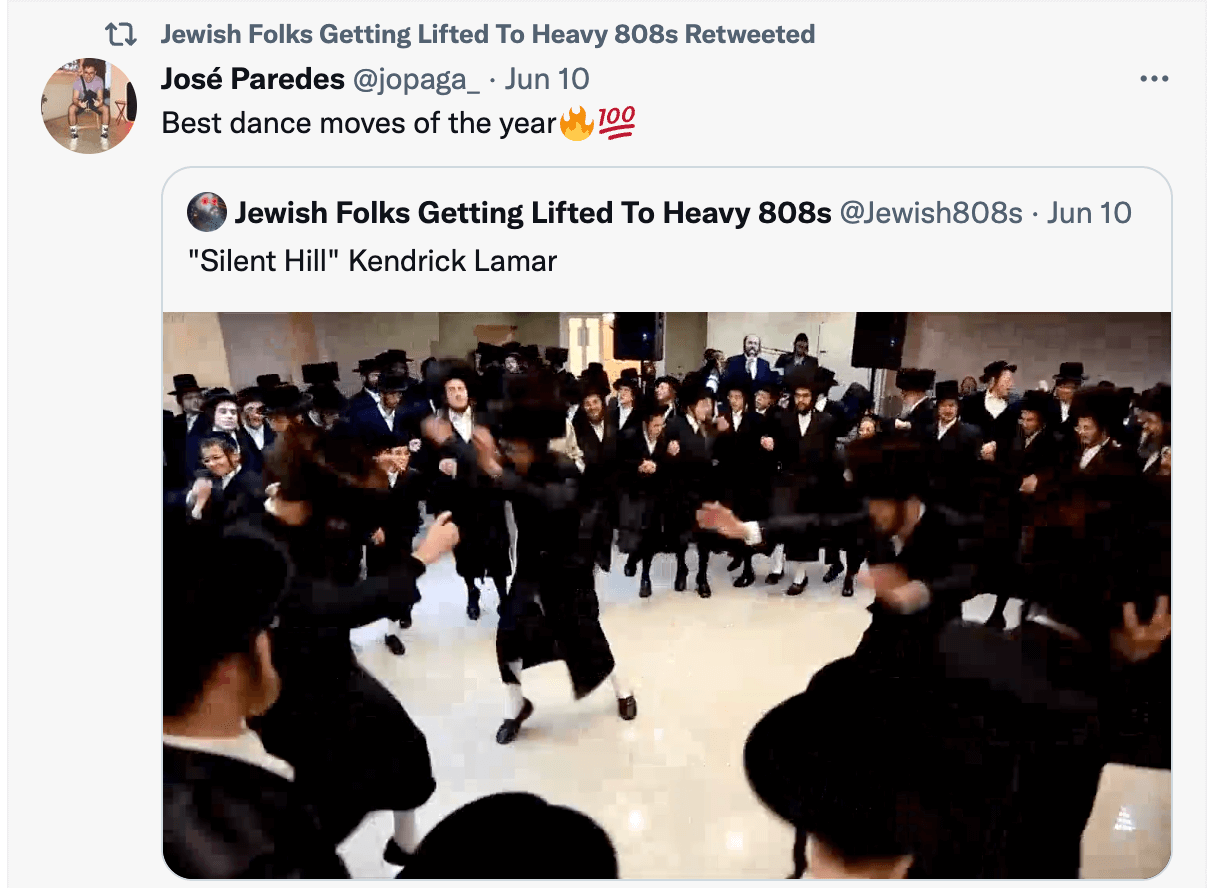
A typical reaction to a @Jewish808s video edit.
Meet the mind behind the hilarious mashups of Hasidic dance and hip-hop
@Jewish808s’ videos keep going viral. What makes the formula so reliable?
Hasidic Jews don’t tend to blast hardcore rap music at their festivities — let alone dance the hora to it. But that’s exactly what appears to be happening in a series of viral videos like this one:
"Silent Hill" Kendrick Lamar pic.twitter.com/plhnafYaKN
— Jewish Folks Getting Lifted To Heavy 808s (@Jewish808s) June 10, 2022
It’s a simple editing trick, of course — in the original video, filmed in 2016 at a wedding in Israel, a live band is playing a Hasidic tune. But the near-perfect synchronization of bass and bochurs has been eliciting fresh delight with each new mashup.
In the three weeks since the Twitter account @Jewish808s posted its first clip — dubbed with a song by the rapper Jeleel! — the account has racked up more than 20,000 followers and its videos have been watched almost eight million times. Many of the comments include some combination of the crying-laughing emoji or the fire emoji or, simply, “AYYYYY.”
Imagining a crossover of insular communities that would otherwise never meet — Haredi Orthodox Jews and fans of contemporary street rap — the meme can reveal something new about both. But the main reason the joke hasn’t gotten old yet, with song after remixed song scoring hundreds of retweets, is because of how convincing the videos are. It really looks like Hasidic people break-dancing and twirling to the beat of distortion-heavy, often profanity-laced rap songs.
“It has to feel like it’s real in some way,” Ori Mannheim, who runs @Jewish808s from his Tel Aviv apartment, said in an interview.
Mannheim, a 23-year-old social media consultant, created the account as a distraction after he lost a bunch of money in the cryptocurrency market. He copied the formula of other popular mashup artists: one video clip, many songs. (His handle refers to the Roland TR-808, a drum machine that’s ubiquitous in hip-hop production.)
His videos, usually around 30 seconds long, follow a simple sequence: while the song’s intro rolls, a few older Hasids march in a slow circle, surrounded by young men with payot and black hats, holding hands. When the bass drops, the scene cuts ahead: several young men dancing, hopping, spinning, hands raised, their high white socks and black shoes kicking up with every down-beat.
"Jimmy Cooks" Drake (ft.21 savage) pic.twitter.com/DBvc4MeIkT
— Jewish Folks Getting Lifted To Heavy 808s (@Jewish808s) June 28, 2022
He’s far from the first to remix the Jewish mosh pit. The mashup artist Brisk God has dubbed videos of Hasids with cloud rap, lo-fi dance and house music.
Ironically, the versatility of the source material can cause him to spend hours on one video as he plugs in different songs, ending up with as many as a dozen final cuts to choose from.
“The way they dance and the moves they do just fit with anything,” said Brisk, who maintains anonymity online, in a Twitter message. “It’s actually mind-boggling.”
Brisk’s theory of what makes the videos popular is that it shows Hasids in a new light — one that makes the stoic men in conservative attire look not only relatable, but hip, too.
That may also speak to the geographical interplay at work in the videos: New York is the birthplace of hip-hop and the de facto American capital of Hasidic Jewry. The cultures are undoubtedly aware of each other to some degree, but there is little overlap.
“When you see these guys not dancing, they seem very serious and disciplined,” Brisk said. “To see them go off and pull off some of the dance moves they are doing is really entertaining in itself.”
Mannheim said “99.9%” of the reaction to his videos has been positive, but he thinks it’s unlikely that the Hasids dancing in his video — who hail from the fervently isolated Mishkenos HaRoim sect in Meah Shearim — will ever see his mashups.
“It’s good that most of them have a kosher phone where they don’t have Twitter or Instagram, so they don’t really have to watch this stuff,” he said.
"Surround Sound" J.I.D (feat. 21 Savage & Baby Tate) pic.twitter.com/pHKuNawket
— Jewish Folks Getting Lifted To Heavy 808s (@Jewish808s) June 23, 2022
On the other hand, some are more receptive. A social media page dedicated to Hasidic music reached out to Mannheim recently, volunteering its videos for him to repurpose, and the accounts soon began promoting each other.
Down in the comment section, Mannheim says he’s noticed Arabs and Israelis bantering good-naturedly.
Heightening the meme’s effect is the use of lesser-known rap — music that nonenthusiasts might have written off as too gritty or inappropriate, seemingly sanctioned by this blithe group of religious men looking happier than you’ve ever seen them.
“The feeling I’m trying to produce most of the time is to make people laugh,” Brisk said, “but I like making videos that give off some good vibes, like you had when you were a kid watching some cartoons or a movie and just totally escaped from reality and were totally 100 percent captivated.”
Just like the Hasids in the video.
A message from our Publisher & CEO Rachel Fishman Feddersen

I hope you appreciated this article. Before you go, I’d like to ask you to please support the Forward’s award-winning, nonprofit journalism so that we can be prepared for whatever news 2025 brings.
At a time when other newsrooms are closing or cutting back, the Forward has removed its paywall and invested additional resources to report on the ground from Israel and around the U.S. on the impact of the war, rising antisemitism and polarized discourse.
Readers like you make it all possible. Support our work by becoming a Forward Member and connect with our journalism and your community.
— Rachel Fishman Feddersen, Publisher and CEO























